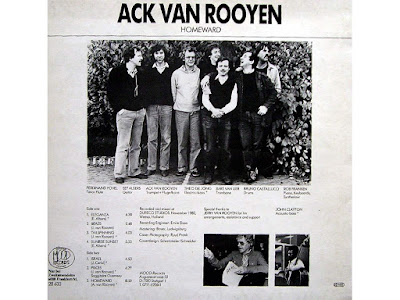The wonderfully named Ack van Rooyen is a Dutch trumpet player and studio musician born 1930.
Today we focus on his twin 1982 albums, very little known, which in all honesty I found brilliant. Notice on Homeward he is complemented by a wonderful group of virtuosos including guitarist Eef Albers who was featured before here to satisfactory completion, I think. Some of his albums were magnificent.
The tracks are all written by different members (Eef contributed a couple of wonderful songs) with my favourite being the odd impression of Pisces, which is by Jerry Van Rooyen (the brother):
And what a progressive fish that is indeed.
Turning our attention to the other release called Some Kind of Changes your jaw will drop when you note that this album, so far undigitized by us and our minions, includes Charlie Mariano, Sigi Schwab, and Eberhard Weber, plus on drums, Branislav Kovacek.
Charlie Mariano, in particular, has been so consistently brilliant throughout the period, with Helen 12 Trees to Sleep my Love, I love him to death. In this album, with compositions mostly by Mladen (Bobby) Gutesha (not appearing on the LP however) we have more of a conventional style of 'contemporary' acoustic jazz, in fact, the blurb on the back makes things quite unclear here:
Modern jazz without electronics-- that was the basic and most important idea in planning this production. Five excellent musicians came together just to make music.
It is up to the listener to classify the category or style of this music.
Category, my ass-- it's easy enough to classify it as contemporary jazz on discogs. But the nice dynamic dissonance of flattened fourths comes together well in this track, appropriately named after its intervals:
Otherwise, the music ranges all over the place from simplistic 'balearic' trash on the last song, to latin rhythms and accordingly super-predictable chord changes, to ECM style smoothness.
Surely the highlight of this post is the Homeward masterwork.


















































